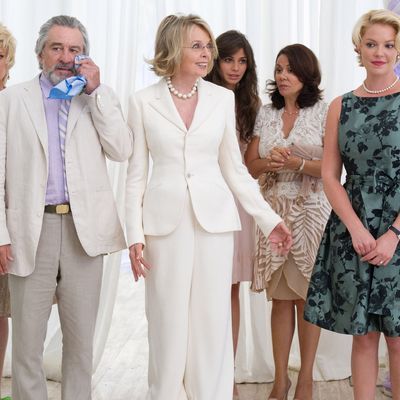
For all its surface amiability, The Big Wedding might be one of the more frustrating films of the year. For the most part, this star-studded comedy about zany family melodramas during one wedding weekend does exactly what you’d expect of something so disposable — it takes generic situations and handles them generically. But the likable cast, made up of so much talent, wins us over just enough to exasperate us that they don’t have more to do.
Here’s the setup: Don (Robert De Niro) and Ellie (Diane Keaton) have three grown kids — two biological, one adopted — and they’ve been divorced for years. She’s been sowing her oats traveling around the world, while he has shacked up with Bebe (Susan Sarandon), Ellie’s best friend, with whom she’s still on good terms. Now everybody’s gathering together because Alejandro (Ben Barnes), the couple’s adopted Colombian son, is getting married to lily-white society girl Missy (Amanda Seyfried). But Alejandro has invited his biological mother, Madonna (Patricia Rae), with whom he has reconnected, to the wedding. Trouble is, she’s a devout Catholic and thinks divorce is a sin. Thus, Don and Ellie have to pretend to still be married. (Really? She’s that religious?) And, sure enough, as they get back together, sparks start to refly. Meanwhile, their oldest, Lyla (Katherine Heigl), has just split up with her husband and discovered she’s pregnant, while their other son Jared (Topher Grace), a doctor who’s been saving himself for true love, is sorely tempted when Madonna brings along Nuria (Ana Ayora), her hot-to-trot daughter.
Got all that? Everything in The Big Wedding feels borrowed from some other movie: a little La Cage aux Folles/The Birdcage here, a little It’s Complicated there. When the horny Nuria secretly jerks off Jared at the dinner table, you might get flashbacks to Wedding Crashers. And so on and so forth. Apparently this is a loose remake of a little-known Swiss film, Mon Frère se Marie, about a Swiss family and their adopted Vietnamese son, and the central conflict there was not about religion but about the fact that the son had been writing to his biological mother for years telling her how perfect his life in the West was, hiding the insane dysfunction in his adopted home. That already makes much more sense than “She’s from Colombia and they don’t believe in divorce over there!” And a Swiss family not knowing a lick of Vietnamese we can understand; why does this ostensibly well-educated, well-off American family not know a word of Spanish — other than for the fact that the screenplay must have it so, to make for cumbersome linguistic hijinks? Add to this some of the most pointless pratfalls I’ve seen onscreen recently, and you’d think we were in for a real, Garry Marshall–level disaster.
But, go figure, The Big Wedding isn’t terrible. De Niro is actually pretty good here — the script gives him plenty of raunchy one-liners, and, while they’re mostly lame, he delivers with conviction, which counts for something nowadays. Keaton, who can be shticky, is fairly restrained and charming. The beautiful Sarandon suffers gracefully, her proud, upturned chin even more upturned than usual. Even Heigl, whose career has been foundering of late after a promising start in rom-coms, manages to evoke some sympathy. But the film has no real idea what to do with these actors, in part because each seems lost in his or her story line, and, at a whisper-thin 90 minutes, the film can’t build up enough narrative energy to bring them all together in any meaningful way.
Not that it seems interested in doing so. Rather, The Big Wedding just tries to remain pleasant — to a fault. The drama of Keaton betraying her best friend by bedding her ex-husband isn’t played up at all — the plot only dwells on it for a few minutes, with the jaunty score jauntily jauntying along as if nothing happened. Meanwhile, the soon-to-be-wed couple — Seyfried and Barnes — make regular faces of outrage or surprise or disgust at the goings-on, but none of it registers, because the film doesn’t seem willing to ever truly lay any of its characters low: Everyone mostly seems to get along. Even the local Catholic priest, played by Robin Williams, whom one presumes would offer some kind of judgment on the proceedings, mostly shrugs at the antics. While Williams’s nonchalance is one of the more interesting elements in the movie, it feels like a strategic mistake — a wasted opportunity to create some narrative urgency. Come to think of it, though, “wasted opportunity” would be a good way to describe the entirety of this tepid, inoffensive trifle.


